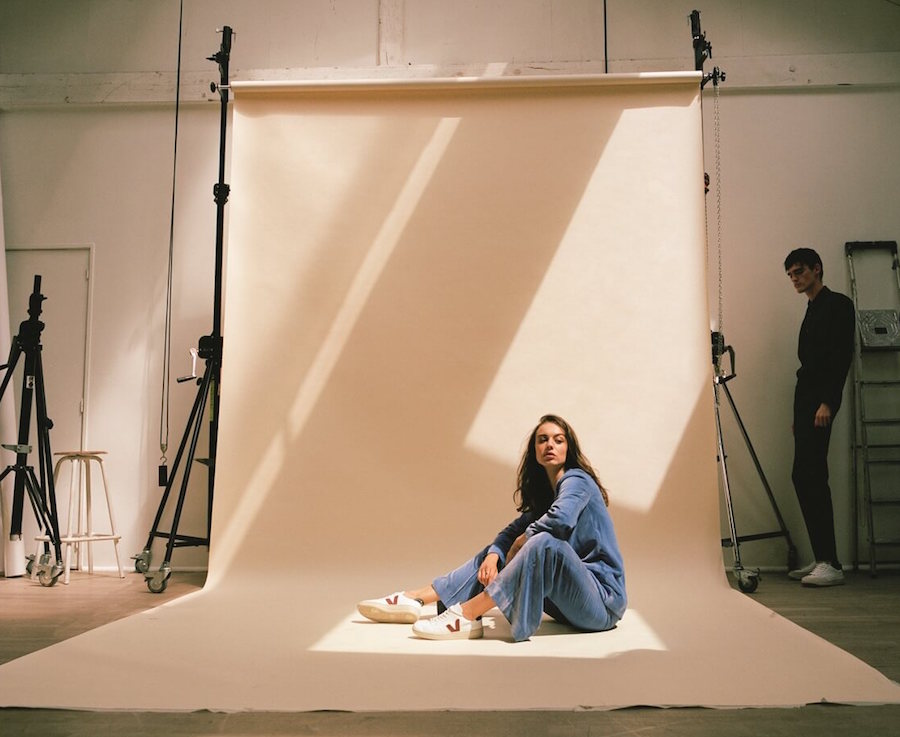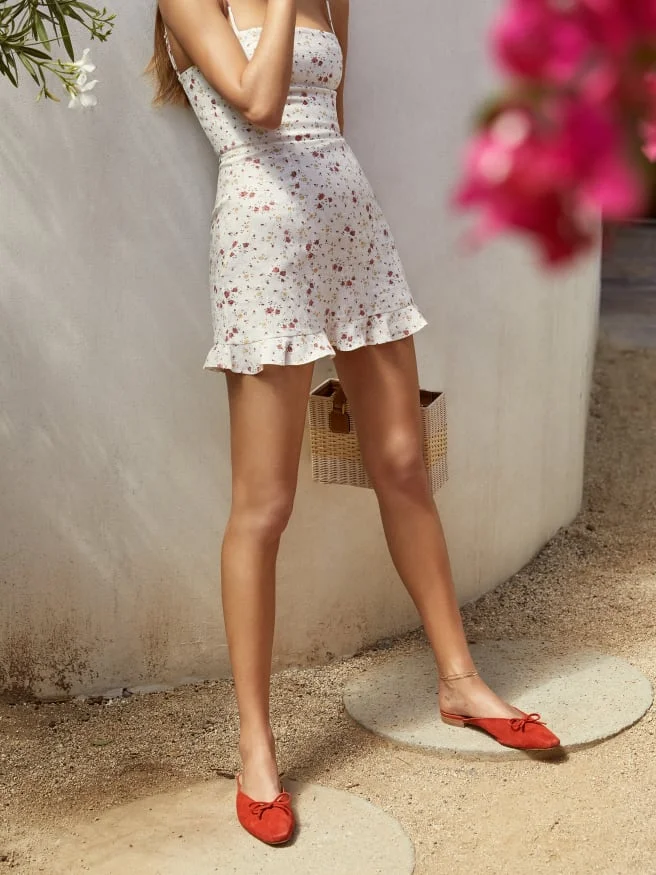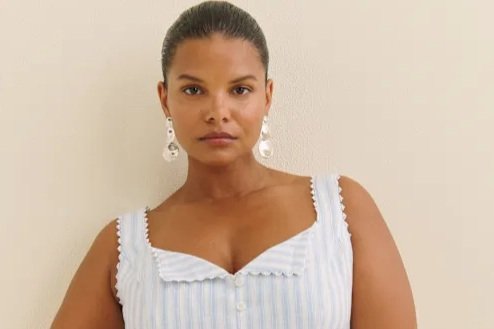5 Good Sustainable Shoe Brands
REFORMATION / BELLE FLAT $178
One of the best known “eco-friendly” brands that couldn’t go without being mentioned is Reformation. Well known for their gorgeous clothing, the brand owns their own sustainable factory in Los Angeles, California, to ensure the most quality work conditions for their workers, which, in turn, also ensures a quality product (they host tours of their factories too!). Their factories are made to minimize their “waste, water, and energy footprints”.
The company also invests in programs that will help to offset any impact they have had on the environment such as The Brazilian Rosewood Amazon Conservation. They recently, “protected 1,000 acres of the Amazon Rainforest from deforestation, contributed 27 million gallons of freshwater to critically dewatered rivers and wetlands in California, and purchased landfill gas offsets”. Talk about putting money where your mouth is. Reformation also makes a huge effort towards being the most energy efficient and recycle-friendly company they can be. In terms of their gorgeous footwear, Reformation has an endless selection of styles to choose from. Their minimalistic and modern aesthetic will have your summer wedding outfits Instagram ready in no time.
MADE TRADE / SALT + UMBER LILY MULE $78
Next on the list: Made Trade. This company brings multiple ethical and sustainable brands together to one place on the internet, which allows for extremely convenient ethical shopping that is just one click away. They hold true to the companies values: to be ethical, uphold fair trade, use production techniques that have heritage, to support only vegan products, and to only offer products that are made in the USA
Made Trade also prides themselves in full transparency, about every product they offer. This means that consumers can have full confidence that what they are buying has, “been responsibly sourced, and expertly handcrafted with sustainable materials.”. All of their shoes offer a variety of interesting and unique tones and textures, such as these Tooche Sunflower Shoes that incorporate cork, wool, and rubber. If you’ll notice, Made Trade offers much more than just shoes and clothing. They sell home goods and furniture as well! So, while you’re shopping around for a pair of colorful vegan shoes, you could totally pick up a few ethically made throw pillows as well!
BAABUK / URBAN WOOLER € 109.00
Blending together “comfort and exploration”, Baabuk, a Swiss-designed ethical footwear brand, is taking new strides in the world of wool. Beginning with the production of slippers, the brand was built from the ground up by founders Galina and Dan, who were inspired by the traditional footwear of Russian Czars.
In the beginning, each pair of slippers took them four hours to make. They expedited their process by creating their own tools as their company and depand for slippers steadily grew. Baabuk now has its B-Corp certification, which in short means that their business meets the highest standard of social and environmental performance. Wool is a very durable material, and it is no mistake that Baabuk has chosen it as its fiber of choice. Since wool has so much longevity, Baabuk believes that not only will their shoes stay out of landfills, but it requires minimal washing which will decrease wateer waste as well. The nature of the production of wool is sustainable in itself, too. Sheep can easily be sheared with no harm to them, creating a valuable renewable resource for us to take advantage of. These same sheep also contribute to the natural carbon cycle by feeding off of the land they inhabit. On top of all of this, wool is easily biodregradable, while synthetic fibers takes years and years to decompose. It is amazing that we can find a lot of the answers to producing ethical materials by looking at what the Earth already has to offer, and that is exactly what Baabuk has done.
ECOVIBE / MIA SWEDISH CLOG $99
A variety of fabircs and textiles go into producing ethically made clothing and shoes. At EcoVibe, a sustainable brand that focuses on exceptionally produced clothing and footwear, they use numerous materials such as tencel, modal, bamboo, cotton, linen, and much more. They also realize that the fashion industry has become the third most polluting industry in the world, and they strive to offset the comparitively minor impact that their company makes.
They do this by working with the 1% For The Planet orginization. This means EcoVibe gives 1% of their sales annually to organizations around the world that work to, “save land, protect forests, rivers and oceans, make agricultural and energy production more sustainable, getting toxins out of the environment, plastics out of the oceans and more.”. They have contributed to the $150 million given back to the planet since 2002. While doing all of this, they also make soem darn cute shoes too, and at a very affordable price. Some favorites of mine are the Sunny Ankle Bootie, and the Westmount Pointed Toe Flat.
VEJA / RIO BRANCO GRAVEL ORANGE SNEAKRS / €115,00
The brand Veja was created based on the idea of “refusing to choose between design and social responsibility”. Think streetwear, but sustainable. That’s what Veja is all about. Veja offers nineteen styles, all made to last, so that less shoes end up in landfills.
Their shoes are made in the state of Rio Grande do Sul in southern Brazil. The workers that work in this factory location are proudly well compensated and live in healthy, livable conditions. It is sad that this is a noteworthy achievement, but 95% of the worlds sneakers are manufactured in Southeast Asian countries with extremely poor pay and working conditions. A main material that Veja uses is called CWL. It is made from corn waste from the food industry, developed by an Italian company. This allows Veja to work towards their goal of moving beyond leather.Veja is also the first sneaker brand to use fabric made entriely from plastic bottles. They call their new fabric “B-Mesh”. B-Mesh is made from collected plastic bottles that are ground up into plastic flakes that are then made into a polyester fiber. Each pair of shoes Veja makes use around three plastic bottles when produced. It is so refreshing to see companies getting creative and innovative with new ways to produce eco friendly textiles that also help reduce waste that would otherwise be sitting in landfills.















